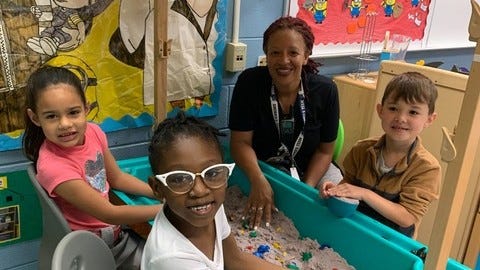
Adults can sometimes have a hard time making sense of everything that’s going on in the world.
But imagine how much more difficult that can be for the young children of the nation’s service members who respond to America’s call. That’s where Sheronda Major comes in.

Major’s work focuses on serving military families and their young children. As program lead at Stone Street Youth Pavilion in Camp Lejeune, N.C., she arms children with the skills they need to learn and helps them combat the stresses of life in the service, including how to cope with deployments and frequent moves.
“I do my best to help them as much as I can,” Major said, adding that she remembers what it was like as a young child when her father deployed.
In addition to being a military child herself, Major’s husband was also in the military, meaning she has also experienced military life from the perspective of a spouse as well.
Major, who has been an educator for 22 years, is also among almost a million educators who have earned their Child Development Associate (CDA) Credential.
“The CDA enhanced my skills, increased my confidence in the classroom, and allowed me to exceed the requirements of my job,” she explained. “The credential also showed me how to build trusting bonds with young learners and their parents.”
The CDA is the most widely recognized credential in early childhood education and is a key stepping-stone on the path of career advancement, Major said. It provides an opportunity for educators working with children from birth to age 5 to demonstrate and strengthen their knowledge, understanding, and practices when teaching in early education.
Major meets her students where they are emotionally while trying to make the classroom a “home away from home” for them as they face challenges related to being a part of a military family.
“Sometimes they just get a few days’ notice that their mom is going, their dad is going, their guardian is going,” Major explained. “They don’t know how to process that.”
She also keeps in contact with her student's parents or guardians and quickly shares any changes in behavior that may be caused by a deployment or move.
“Sometimes children need different outlets,” Major said.
Major said she pursued the credential as a means of professional development and growth. “I think it has helped me a lot,” she continued.
Major is also encouraging her colleagues to pursue the certification.
“Knowledge is power,” she said. “The more you know, the better you can be at what you do.”
Major said it took her several months to earn the designation. She was required to collect data and interview her parents as part of the credentialing process. “It’s so worth it,” she said.
Major has been involved in early childhood education for 22 years.
“I just really, really wanted to work with children and just love them,” she said. “That’s what made me go on that career path.”
Major also had some advice for parents who are helping their children cope with the stressors of military life.
“Just try to do your best to understand what they are going through,” she said. “Especially in the little ones, if something is going on, they will show it.”
Read a book with your child, play with your child, talk with and listen to your child, she urged.
Reach Julia LeDoux at Julia@connectingvets.com.




